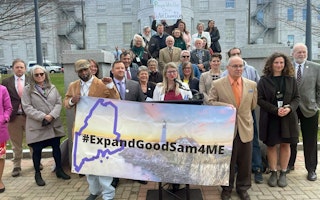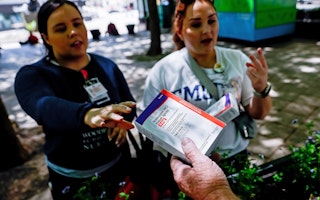Drug Policy and Human Rights in Russia: The Andrey Rylkov Foundation Needs Your Help
By Alec Khachatrian
Russia never fails to keep human rights activists busy, it seems. Laws against “homosexual propaganda” are popping up, causing a strong reaction from singer Madonna. Three young women have been jailed for “insulting” the Church (or, more likely, the old-new President Putin), and Amnesty International just named them “prisoners of conscience.” And then, of course, there’s the war on drugs.
A few weeks ago, the Russian Federal Drug Control Service (FSKN) came forward with a proposal to make it a crime to use drugs (drug use is still an administrative offense). According to this new motion, every person who uses drugs “two or more times in a year” is considered a systemic user and should be punished. If the proposal becomes reality, a person accused of drug use could be sentenced to up to two years in prison. Earlier the Russian government announced its intention to introduce compulsory treatment for drug dependence. The authorities clearly reject any attempts at humanizing Russia’s drug policy; moreover, on that issue they do not tolerate dissent.
In February 2012, the website of Moscow-based Andrey Rylkov Foundation for Health and Human Rights was shut down on an order from FSKN citing “placement of materials that propagandize (advertise) the use of drugs, information about distribution, purchasing of illegal drugs and inciting the use of drugs.”
What was it all about? Methadone. The foundation had published information about opioid substitution therapy. According to Russian legislation and anti-drug strategy until 2020, such information cannot be publicly distributed unless sanctioned by the authorities. Apparently, sanctioned information should look something like this: “The view in the Russian Federation is that replacement therapy programs do not have a therapeutic effect on the drug addict and do not address problems of HIV infection.” The Rylkov Foundation, on the other hand, shares the World Health Organization's view that “substitution maintenance therapy is one of the most effective types of pharmacological therapy of opioid dependence.”
Perhaps these polarized views could somehow be reconciled in the framework of a scientific discussion, but that type of discussion is exactly what the Russian government is trying to prevent through legislation and practice. However, since the government cannot say openly that it is against science, General V. Ivanov, the head of FSKN, stated publicly at a recent meeting of the Commission for Narcotic Drugs in Vienna that the website was shut down because it was used “in the sales of illegal substances.” But clearly this is not a drug control issue; this is a political issue—a violation of the right to information.
The Rylkov Foundation's website says it is “a grassroots organization from Moscow, Russia, with the mission to promote and develop humane drug policy based on tolerance, protection of health, dignity and human rights.” The organization is named after Andrey Rylkov, a well-known Russian harm reduction activist and one of the founders of the FrontAIDS movement. The foundation is unique because it provides direct services to drug users, documents the effects of the war on drugs, performs strategic litigation, engages in harm reduction advocacy and speaks out for drug law reform. In fact, it does all of this without a large staff or even an office. And without any support from the Russian government.
According to Russian authorities, 62,000 new HIV cases were registered in the country in 2011—5 percent more than in 2010. Russia has about 5 million drug users, and the HIV epidemic continues to be driven by unsafe practices related to injecting drug use (57 percent of all new cases). Instead of supporting low-threshold services for drug users, several years ago the government announced that it would no longer support harm reduction and would instead focus on “healthy lifestyle” promotion—clearly a nod to the conservative end of the political spectrum. One of the features of the new approach is an attack on needle exchange and repeated vows to fight against anyone who dares bring up the issue of opioid substitution therapy. This includes sharing research data and other information about the benefits of substitution treatment. And that’s exactly what the Rylkov Foundation has been doing since its inception in 2009.
In three years since the foundation helped launch a working group on substitution therapy in Russia, the organization has done more than any other to promote unbiased, science-based discussion on that topic. In addition to two important publications documenting the reality of the Russian war on drugs—Report on the Course of Implementation by the Russian Federation of the Political Declaration and Plan of Action on International Cooperation towards an Integrated and Balanced Strategy to Counter the World Drug Problem and Atmospheric Pressure: Shadow Report to the UN Committee against Torture in Relation to the Review of the Fifth Periodic Report of the Russian Federation—the foundation has posted online news from all over the world about substitution therapy, analysis of Russian legislation and practice, and suggested ideas for change. The foundation's "Narcophobia" campaign helps dispel myths and fears in Russia regarding European science- and human rights–based policy. Seeing all this “unsanctioned activity,” the FSKN took action.
First, right after Christmas, Rylkov Foundation founder and president Anya Sarang received a call from the Ministry of Interior about a complaint against the foundation; then she got a request for a meeting with a Moscow prosecutor’s office. Finally, on February 3, 2012, the foundation's website was shut down.
Quoting Human Rights Watch, UNHCR called the closure of the website “an assault on freedom of expression in the midst of pro-democracy protests.” The organization Article 19 stated that “the right to information is essential to realizing the right to health.” Sir Richard Branson spoke against the website closure, noting “Russia must change this outdated policy as it attempts to get on top of its own growing drug and HIV problem.” The Hungarian Civil Liberties Union, through their Drug Reporter website, has distributed updates about the site closure and explains how to demand that FSKN revoke its decision.
What must be done next? Russian bureaucrats view the European drug experience with suspicion and condescension, always ready to proclaim that Russia has its own way. Meanwhile, thousands of people each year are becoming infected with HIV, hepatitis, and TB. Even Russia’s own surgeon general, G. Onischenko, issued a March 2012 decree that the HIV situation in Russia has worsened, that most prevention programs for vulnerable groups have been discontinued, and that “healthy lifestyle” propaganda is not working for those groups.
We believe that the Andrey Rylkov Foundation should try to become as independent as possible from the whims of the government. And for this we need your support.
We've started a campaign on GlobalGiving.org to collect $60,000 for a mobile harm reduction clinic that would exchange needles, provide HIV and hepatitis tests, and refer drug users to other specialists. The mobile clinic is especially needed during the long and harsh Moscow winters; in Anya Sarang’s words, “last winter was so freezing we couldn’t even perform the rapid tests [for HIV] as the buffer was freezing right away!” In the first few days of the campaign, we collected over $5,000. But much more needs to be done to make mobile outreach a reality in Moscow.
We count on your support. Please tell your friends and colleagues about the campaign, and please donate on GlobalGiving.org. Together we can help vulnerable people who use drugs, and turn the tide of misguided Russian drug policy.
The Andrey Rylkov Foundation is a grantee of the Open Society Foundations.
Alec Khachatrian is a member of the Andrey Rylkov Foundation.


